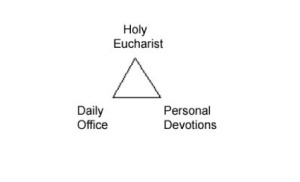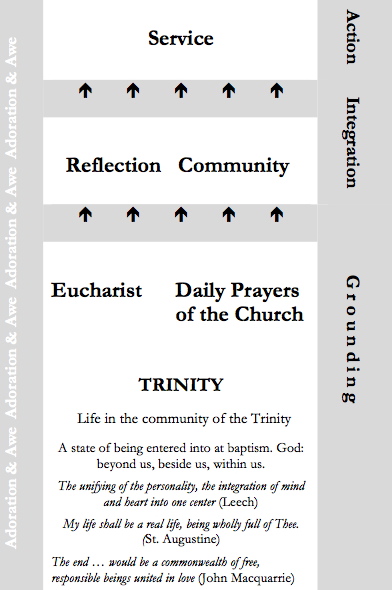SPIRITUAL MAPS
Prayer must involve the unifying of the personality, the integration
of mind and heart into one center.... Without self-discovery there
can be no further progress. 'In order to find God whom we can only
find in and through the depths of our own soul, we must first find
ourselves.' Without self-knowledge our love remains superficial. ―Kenneth Leech
A map offers a system of spiritual life rather than a list of assorted practices. A useful system will provide a balance of nurture and stretching. It will include our inner life and our outer life. In such a system our inclinations and gifts are supported and allowed to flourish and the less developed parts of us are drawn out and developed. All so we may become stronger in love and faith; more resilient, with a broader mind and an enlarged heart.
Maps are useful things.
1. They are based on the experience of many others. This is how others have made the journey.
2. They help you gets somewhere. If you want to grow in the spiritual life it may help to have a guide.
3. They change as the circumstances of life change. In a world of rapid change and loose ties among people, we have an increased need for a sense of perspective, being in community, and engaging daily routines that give us ground to stand upon.
4. They are only useful if people find them useful. People vary in temperament and spiritual inclination. Maps can provide too much or too little detail for different groups of people.
The Prayer Book Rule
This map is grounded in Benedictine spirituality and the Prayer Book.
Our worship tradition as Episcopalians is based on a three-part structure. Michael Ramsey, the one-hundredth Archbishop of Canterbury, referred to it as the "Benedictine triangle." Martin Thornton called it the "Catholic Threefold Rule of Prayer." It is the Prayer Book's way of prayer. The three elements ― Eucharist, Daily Office, and Personal Devotions ― comprise the fundamentals of a disciplined Christian spirituality in the Anglican tradition.

The use of this pattern can help individuals and parishes move away from the attempt to base our prayer life on a self-made, unintegrated list of "rules" toward an integrated Rule grounded in The Book of Common Prayer.
The active relationship among Eucharist/Daily Office/Personal Devotions can be seen in how the Office is deepened and enriched by a person's personal devotions, how all three influence one another, and how the Office and personal devotions are focused and completed in the Eucharist.
Holy Eucharist: Also known as the Mass and the Holy Communion. Participation on Sundays and Major Feast Days.
Daily Office: A pattern of reading the appointed scriptures, and joining in the church's daily act of praise and adoration. Said in some manner each day.
Personal Devotions: These are ways of expressing our unique relationship with God. Some are drawn to contemplation, others to intercessory prayer, some to the use of icons, others to prayer beads.
In Your Holy Spirit Map

Weekly Practice: Holy Eucharist
Being present for the Holy Eucharist at least once a weak.
Daily Practice: The Daily Prayers of the Church
Saying the Daily Office in some form each day.
Reflection
Identifying and maintaining ways of being reflective, and gaining perspective, that works for you. Creating space for stillness and silence.
Parish Community
Participating in the parish community in some manner. This is a community where our differences can be expressed and will be accepted; in which we can fight with those we love without fearing the loss of the relationship.
Serve
To the extent we have given ourselves to awe and adoration, our service in daily life — with friends, family, at work, in civic life, and in all the places and circumstances we find ourselves — our service will flow organically from that awe and adoration.
Much of the above comes from the In Your Holy Spirit books of Fr. Robert Gallagher and Michelle Heyne. Ascension Press, 2011; Gallagher's Fill All Things: The Dynamics of Spirituality in the Parish Church, and the various works of Martin Thornton.